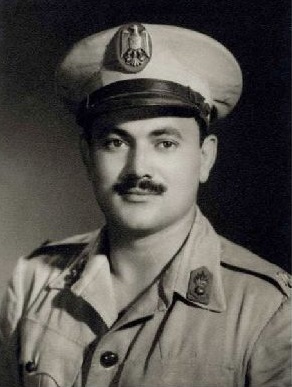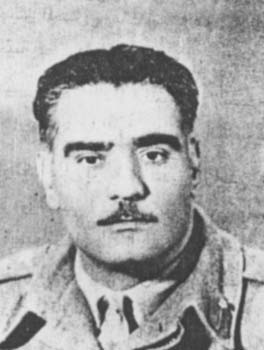|
Egyptian Revolutionary Command Council
The Revolutionary Command Council (RCC; ''Majlis Qiyāda ath-Thawra'') was the body established to supervise the Republic of Egypt and Anglo-Egyptian Sudan after the Revolution of 1952. It initially selected Ali Maher Pasha as Prime Minister, but forced him to resign after conflict over land reform. At that time, the Council took full control of Egypt. The RCC controlled the state until 1954, when the Council dissolved itself. History In July 1952, a group of disaffected army officers (the "Free Officers") led by General Muhammad Naguib and Colonel Gamal Abdel Nasser overthrew King Farouk. The revolutionaries then formed the Egyptian Revolutionary Command Council, which constituted the real power in Egypt, with Naguib as chairman and Nasser as vice-chairman. After assuming power, the Free Officers were not interested in undertaking the day-to-day administration of the Egyptian government. Thus, the Free Officers passed power to Ali Mahir Pasha, a long-time political i ... [...More Info...] [...Related Items...] OR: [Wikipedia] [Google] [Baidu] |
Republic Of Egypt (1953–1958)
The Republic of Egypt was a state created in 1953 under the rule of Mohammed Naguib following the Egyptian revolution of 1952 in which the Kingdom of Egypt's Muhammad Ali dynasty came to an end. It was superseded in 1958 with the creation of the United Arab Republic. The territory of the state compromised modern day Egypt as well as the Gaza Strip, governed by the All-Palestine Protectorate. The territory also included modern day Sudan and South Sudan until 1956 when the Anglo-Egyptian Sudan Condominium was abolished, granting the Republic of the Sudan independence. The Revolution The Free Officers The Republic of Egypt was created following the 1952 Egyptian revolution led by the Free Officers, a group of army officers who wanted to overthrow King Farouk and abolish the Muhammad Ali dynasty in Egypt which was led by Mohamed Naguib and Gamal Abdel Nasser. The Free Officers's goals were to abolish the Kingdom of Egypt, to establish a republic, end the British occupation ... [...More Info...] [...Related Items...] OR: [Wikipedia] [Google] [Baidu] |
Kamal El-Din Hussein
Kamal El-Din Hussein (; 2 January 1921 – 19 June 1999) was a member of the Egyptian Free Officers who overthrew King Farouk. Early life and education Kamal El-Din Hussein was born in 1921 in Banha, Qalyubia. He was admitted to military college in 1937. In 1939 he received the bachelor's degree of military science from the Egyptian Military Academy. He served in the field artillery unit in the Western Desert, to fight with the British against the advancing army under Rommel in World War II. Political career Hussein was a founding member of the Free Officers, and his rank was major during his membership to the group. He was appointed member of the Egyptian Revolutionary Command Council after the 1952 Revolution. During the presidency of Gamal Abdel Nasser he was named the president of the teachers' syndicate. He was also appointed minister of social affairs in 1954. He was named the minister of education in late 1957 following the elections in October. In February 1958 ... [...More Info...] [...Related Items...] OR: [Wikipedia] [Google] [Baidu] |
Minister Of The Interior
An interior minister (sometimes called a minister of internal affairs or minister of home affairs) is a cabinet official position that is responsible for internal affairs, such as public security, civil registration and identification, emergency management, supervision of regional and local governments, conduct of elections, public administration and immigration (including passport issuance) matters. This position is head of a department that is often called an interior ministry, a ministry of internal affairs or a ministry of home affairs. In some jurisdictions, there is no department called an "interior ministry", but the relevant responsibilities are allocated to other departments. Remit and role In some countries, the public security portfolio belongs to a separate ministry (under a title like "ministry of public order" or "ministry of security"), with the interior ministry being limited to control over local governments, public administration, elections and similar matte ... [...More Info...] [...Related Items...] OR: [Wikipedia] [Google] [Baidu] |
Prime Minister Of Egypt
A prime number (or a prime) is a natural number greater than 1 that is not a product of two smaller natural numbers. A natural number greater than 1 that is not prime is called a composite number. For example, 5 is prime because the only ways of writing it as a product, or , involve 5 itself. However, 4 is composite because it is a product (2 × 2) in which both numbers are smaller than 4. Primes are central in number theory because of the fundamental theorem of arithmetic: every natural number greater than 1 is either a prime itself or can be factorized as a product of primes that is unique up to their order. The property of being prime is called primality. A simple but slow method of checking the primality of a given number , called trial division, tests whether is a multiple of any integer between 2 and . Faster algorithms include the Miller–Rabin primality test, which is fast but has a small chance of error, and the AKS primality test, which always pro ... [...More Info...] [...Related Items...] OR: [Wikipedia] [Google] [Baidu] |
Kafr Dawar
Kafr El Dawwar ( ) is a major industrial city and municipality on the Nile Delta in the Beheira Governorate of northern Egypt. Located approximately 30 km from Alexandria, the municipality has a population of about 265,300 inhabitants and comprises a number of smaller towns and villages. History Kafr El Dawwar was the location of the famous Battle of Kafr El Dawwar between the Egyptian army, headed by Ahmed Orabi, and the British army, during the Anglo-Egyptian War of 1882. For five weeks, Orabi was able to stop British forces from advancing toward the Egyptian capital of Cairo. Egyptian victory in the battle compelled the British to change their strategy, with British forces shifting to the Suez Canal to reach Cairo through Tel El Kebir. In the early months of the Egyptian Revolution of 1952, Kafr El Dawwar was the scene of industrial action that resulted in death sentences for two leaders of the strike. In September 1984, protests broke out in Kafr El Dawwar over ... [...More Info...] [...Related Items...] OR: [Wikipedia] [Google] [Baidu] |
Ali Mahir Pasha
Aly Maher Pasha (; 9 November 1882 – 25 August 1960) was an Egyptian political figure. He was minister of finance from 1928 to 1929. He served as Prime Minister of Egypt from 30 January 1936 to 9 May 1936, a second term from 18 August 1939 to 28 June 1940, a third term from 27 January 1952 to 2 March 1952 and a final fourth term from 23 July 1952 to 7 September 1952. His final term ended when he was forced to resign for his opposition to the Egyptian land reform initiated by the Revolutionary Command Council during the Egyptian Revolution of 1952 The Egyptian revolution of 1952, also known as the 1952 coup d'état () and the 23 July Revolution (), was a period of profound political, economic, and societal change in Egypt. On 23 July 1952, the revolution began with the toppling of King .... In 1942, Maher Pasha was removed from office and interned for the rest of the war due to his pro-German sympathies. References External links * 1882 births 1960 ... [...More Info...] [...Related Items...] OR: [Wikipedia] [Google] [Baidu] |
Farouk Of Egypt
Farouk I (; ''Fārūq al-Awwal''; 11 February 1920 – 18 March 1965) was the tenth ruler of Egypt from the Muhammad Ali dynasty and the penultimate King of Egypt and the Sudan, succeeding his father, Fuad I, in 1936 and reigning until his overthrow in a military coup in 1952. His full title was "His Majesty Farouk I, by the grace of God, King of Egypt and the Sudan". As king, Farouk was known for his extravagant playboy lifestyle. While initially popular, his reputation eroded due to the corruption and incompetence of his government. He was overthrown in the 1952 coup d'état and forced to abdicate in favour of his infant son, Ahmed Fuad, who succeeded him as Fuad II. Farouk died in exile in Italy in 1965. His sister, Princess Fawzia bint Fuad, was the first wife and consort of the Shah of Iran, Mohammad Reza Pahlavi. Early life and education He was born as ''His Sultanic Highness'' Farouk bin Fuad, Hereditary Prince of Egypt and Sudan, on 11 February 1920 (Jumada al ... [...More Info...] [...Related Items...] OR: [Wikipedia] [Google] [Baidu] |
Ahmed Anwar
Ahmad () is an Arabic male given name common in most parts of the Muslim world. Other English spellings of the name include Ahmed. It is also used as a surname. Etymology The word derives from the root ( ḥ-m-d), from the Arabic (), from the verb (''ḥameda'', "to thank or to praise"), non-past participle (). Lexicology As an Arabic name, it has its origins in a Quranic prophecy attributed to Jesus in the Quran which most Islamic scholars concede is about Muhammad. It also shares the same roots as Mahmud, Muhammad, Hamed, and Hamad. In its transliteration, the name has one of the highest number of spelling variations in the world. Some Islamic traditions view the name Ahmad as another given name of Muhammad at birth by his mother, considered by Muslims to be the more esoteric name of Muhammad and central to understanding his nature. Over the centuries, some Islamic scholars have suggested the name's parallel is in the word 'Paraclete' from the Biblical text,"Isa", ... [...More Info...] [...Related Items...] OR: [Wikipedia] [Google] [Baidu] |
Youssef Seddik (revolutionary)
Youssef Seddik (, often spelt Yusuf Sadik or Yusef el-Sadiq) (January 3, 1910 – March 31, 1975) was an Egyptian military figure and politician. He is noted for his role in launching the first military procedures in the Egyptian Revolution of 1952. Military career Seddik graduated from Military Academy in 1933. He was active in the 1948 Palestine War. He joined the ranks of the underground Free Officers Movement in 1951, becoming its most senior member after Muhammad Naguib, and was a lieutenant-colonel of the infantry by 1952. Seddik had been a member of a Communist organisation, the Democratic Movement for National Liberation (DMNL), when the Free Officers requested his membership. On July 23, 1952 was the first to take army action at the beginning of the coup which removed King Farouk and the monarchy from power. He had swiftly moved his forces to occupy the Egyptian Army Headquarters at Kobri al-Qubba an hour before the appointed time. Some attribute this to a glitch in comm ... [...More Info...] [...Related Items...] OR: [Wikipedia] [Google] [Baidu] |
Kamal Rifaat
Kamal Rifaat (; 1 November 1921 – 13 July 1977) was an Egyptian military officer and one of the members of the Free Officers movement. He held several government posts after the Egyptian revolution in 1952. Early life and education Rifaat was born in Alexandria on 1 November 1921. His father was an engineer. After completing primary and secondary education in Cairo Kamal Rifaat graduated from the military academy. Career Kamal Rifaat joined the Egyptian army in 1941 and served there until 1945. He was part of the Iron Guard along with Captain Mustafa Kamal Sidqi and Anwar Sadat which was composed of the supporters of King Farouk. Then he worked in Khartoum, Sudan, in a secret organization to resist the British occupation. Next, he participated in the 1948 Palestine War during which he met Gamal Abdel Nasser. Rifaat joined the Free Officers movement which carried out the Egyptian revolution in 1952. He was part of the first cell of the movement founded by Nasser. He becam ... [...More Info...] [...Related Items...] OR: [Wikipedia] [Google] [Baidu] |



